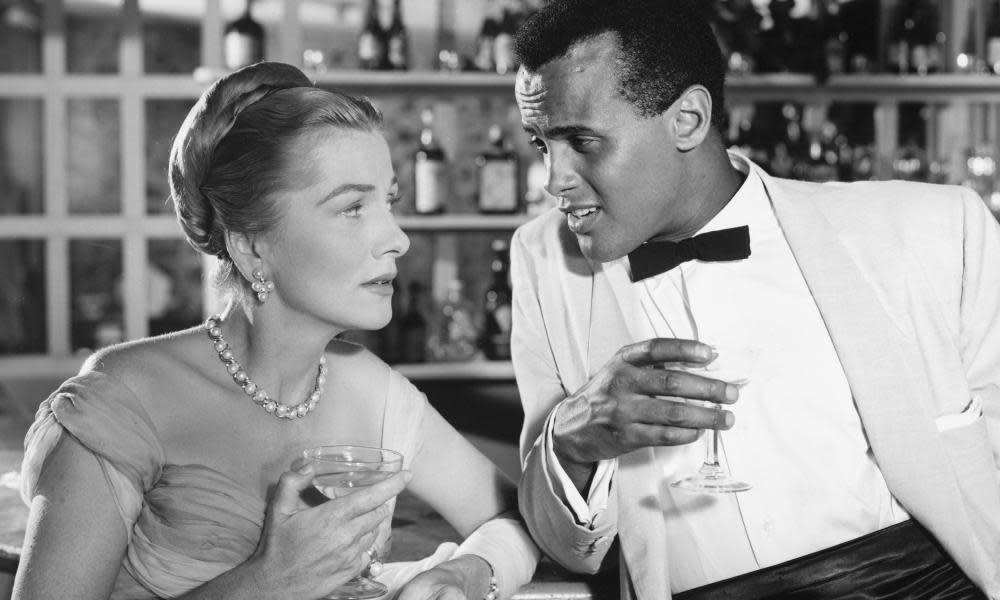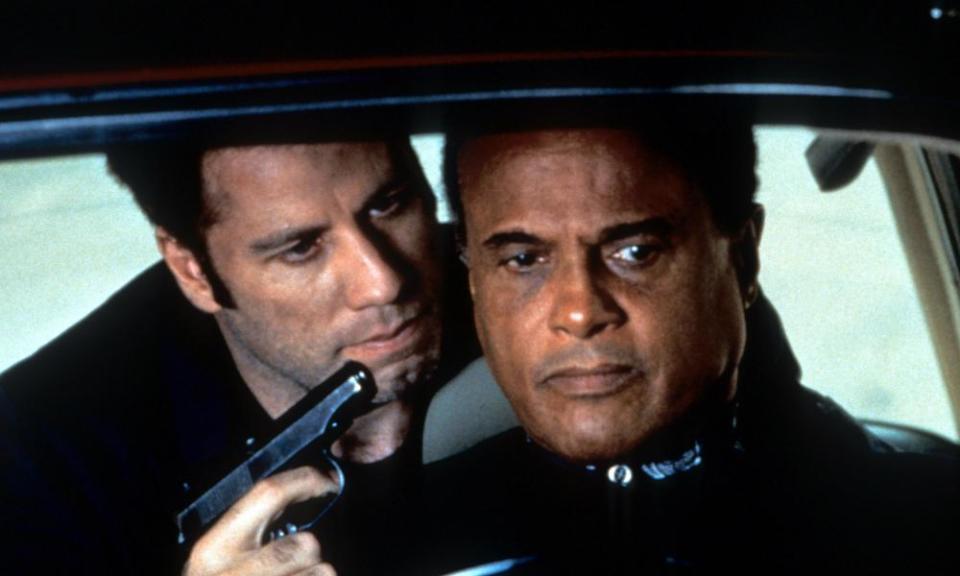Bans, bigots and surreal sci-fi love triangles: Harry Belafonte’s staggering screen career

In the middle of the 20th century, Harry Belafonte was at the dizzying high point of his stunning multi-hyphenate celebrity: this handsome, athletic, Caribbean-American star with a gorgeous calypso singing voice was at the top of his game in music, movies and politics. He was the million-selling artist whose easy and sensuous musical stylings and lighter-skinned image made him acceptable to white audiences. But this didn’t stop him having a fierce screen presence and an even fiercer commitment to civil rights. He was the friend and comrade of Paul Robeson and Martin Luther King Jr – and his crossover success, incidentally, never stopped him being subject to the ugliest kind of bigotry from racists who saw his fame as a kind of infiltration. His legendary Banana Boat Song with its keening and much-spoofed call-and-response chorus “Day – O!” is actually about the brutal night shift loading bananas on to ships, part of an exploitative trade with its roots in empire.
His friend and rival Sidney Poitier (there is room for debate in exactly how friendly their rivalry really was) may have outpaced him in the contest to become Hollywood’s first black American star, being perhaps able to project gravitas more naturally and reassuringly. But Belafonte, for all his emollient proto-pop performances on vinyl, was arguably more naturally passionate. Crucially, his great movie breakthrough was with an all-black cast (though with the white director Otto Preminger) in Carmen Jones. In this 1954 film, Belafonte built on the screen chemistry he had had with the sensational star Dorothy Dandridge in their previous film together, Bright Road (a high school movie with Belafonte as the school’s headteacher, anticipating Poitier’s Blackboard Jungle and To Sir, With Love).
Three years later, in Robert Rossen’s Island in the Sun – adapted from the novel by Alec Waugh, brother of Evelyn – Belafonte sang the catchy, dreamy title song but had a spikier dramatic role as the up-and-coming trade unionist in the fictional West Indian island, confronting the white colonial ruling class. Again, Belafonte was cast with the much-loved Dandridge but his implied dangerous liaison is with a white woman, played by Joan Fontaine, connected with the family that runs the plantation. This was the sexual suggestion that had the film pulled from most movie theatres in the US south.
Coming at the end of the 1950s, Robert Wise’s Odds Against Tomorrow was that rarest of things: a noir starring a black man. Belafonte was Ingram, the club singer with crippling debts who is inveigled into helping rob a bank, alongside a hardbitten professional criminal and racist, the role taken by veteran player Robert Ryan. It was a pairing to savour, Belafonte participating in the white/black crime duo that Hollywood often found expedient when it came to accommodating a black character in a contemporary US context. Belafonte’s casting as a singer in the story has a potency and style.
But perhaps Belafonte’s strangest but most distinctive role came in the 1959 post-apocalyptic sci-fi fantasy The World, The Flesh and The Devil in which he is Burton, the mining engineer trapped miles below the surface of the earth after a calamitous cave-in. But he has escaped the effects of an atomic catastrophe and when he finally scrambles to the surface, Burton finds that he is apparently the only human left alive – except for one white woman and one white man, with whom he finally has a surreal but gripping contest for the woman’s affections.
And so Belafonte finds himself in a rather daring political what-if movie: an apocalypse is the only way to make acceptable the idea of interracial love, and yet even here racism and white male paranoia rears its head. Making this the scenario for sexual rivalry is somehow inspired although the resolution is a little tame. In some ways, the futurist movie anticipated his role opposite John Travolta in the race-reverse fantasy White Man’s Burden from Japanese film-maker Desmond Nakano, in which Belafonte is the plutocrat with a privileged position in an anti-white world and Travolta is the white factory worker who gets in trouble through accidentally seeing the boss’s wife in a state of undress – a bizarre but shrewd satirical touch.

Yet for all this, Belafonte arguably found true freedom as a black artist in the movies when it came to having a black director – and this came with Poitier himself who directed himself and Belafonte in the neglected (and now rediscovered) 1972 classic Buck and the Preacher, the pair giving great performances to match Butch and Sundance. Belafonte’s was probably the performance of his career as the itinerant opportunist chancer and thief, nicknamed The Preacher, who makes common cause with Poitier’s more upstanding frontiersman to defeat a murderous white posse.
This film, and the subsequent action comedy Uptown Saturday Night, again directed by Poitier with Belafonte as the scrappy hoodlum and gangster, gave Belafonte his stake in the blaxploitation revolution and showed what a tough, black comic player he could be. His capacity for menace was exploited by Robert Altman in his 90s jazz age confection Kansas City in which he was excellent as the mobster and gambling kingpin who is about to execute an underling (played by Dermot Mulroney) for betraying him and for having the bad taste to wear blackface as a disguise.
All this, and later cameos such as his appearance in Spike Lee’s BlacKkKlansman add up to an amazing movie career, though perhaps one in which he never quite achieved a single breakout starring role to match his music profile or his importance as a political campaigner. But he amassed a living legend status: the fighter, the tough guy and the romantic hero.

 Yahoo News
Yahoo News 
